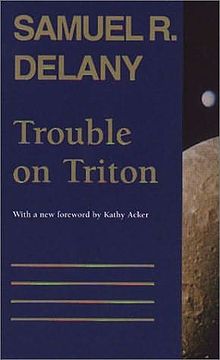After the last post on Ursula Le Guin’s The Dispossessed, it made sense to me to read through Samuel Delany’s Trouble on Triton in my best of utopian sci-fi experiment. (An experiment that is taking a lot longer than I expected). The Nebula award nominated 1976 novel Trouble on Triton is a very deliberate response to the The Dispossessed—announced on the title page by their warring subtitles: “An Ambiguous Heterotopia” and “An Ambiguous Utopia” respectively.
 Samuel Delany takes the concept of the heterotopia from French philosopher Michel Foucault’s book The Order of Things (although there was a posthumously published lecture “Of Other Spaces” later). Foucault writes, “Utopias afford consolation: although they have no real locality there is nevertheless a fantastic, untroubled region in which they are able to unfold… Heterotopias are disturbing, probably because they make it impossible to name this and that, because they shatter or tangle common names.” Later—in “Of Other Spaces”—Foucault writes, “brothels and colonies are two extreme forms of heterotopia…and…the ship is the heterotopia par excellence.”
Samuel Delany takes the concept of the heterotopia from French philosopher Michel Foucault’s book The Order of Things (although there was a posthumously published lecture “Of Other Spaces” later). Foucault writes, “Utopias afford consolation: although they have no real locality there is nevertheless a fantastic, untroubled region in which they are able to unfold… Heterotopias are disturbing, probably because they make it impossible to name this and that, because they shatter or tangle common names.” Later—in “Of Other Spaces”—Foucault writes, “brothels and colonies are two extreme forms of heterotopia…and…the ship is the heterotopia par excellence.”
The linking of these two ideas is obviously important for Delany. I actually came to Delany through his excellent Times Square Red, Times Square Blue, which is a reflection on late 1970s and early ’80s Times Square porn theaters as a cruising ground for gay men. This is exactly the kind of space Foucault is talking about when he discusses heterotopias. And I take it this is what Delany has in mind as well.
So what do we get in The Trouble on Triton? We get Bron Helstrom! Ex-male prostitute (mostly for women), who is so cocksure in fundamentally all he says and does that he finds himself completely unable to fit into a world where everything, theoretically, should be provided for him. Though the book begins with Bron declaring: “I am a reasonably happy man,” his happiness lasts only until the tragic love interest The Spike shatters it ten pages in.

A famous director and actor in small theater pieces aimed at breaking through routine, banality, and the everyday, The Spike is initially interested in how her theater practically renders Bron inarticulate, prone, and suddenly (although only momentarily) open to new sensations, desires, and ideas. (My guess it this is because of the melodious guitar playing of one Charo). This passes soon (SPOILER ALERT) because he’s a total toolbox. On their second or third date he takes a walk with her because he wants to learn something about The Spike, but can only prattle tirelessly on about himself and his shame and discomfort in the world.
When The Spike (who Bron calls Spike throughout the text, even though her name is clearly something else) breaks it off with him through intergalactic letter (more or less brutal than text?), he howls into the desert about how she’s crazy while staring at a list of grievances that I, too, had written down about his general character. What I’m trying to say is that Delany walks a difficult line where Bron is so unlikable that I am unsure whether or not we are supposed to feel like we are learning or horrified by his mistakes. I find myself judging books based on how often I slap my forehead with my hand and mutter things like “aww come on.”
She could have saved a lot of intergalactic postage and just written: Dear Bron, you’re a twit. THE Spike.
Part of the central thrust of Delany’s argument is that even if all types exist and have been provided spaces to flourish, you may not find your type; instead, you might find yourself wandering pitiably alone cursing the injustice of a world that never promised justice. And in that way the book is quite good. We have to wonder about the people who fall through the cracks of utopian desire. In totally different language: you always want to figure out who is picking up the garbage. Talking about the end of the novel is such a huge spoiler that I’m not going to even start, but suffice it to say getting a boob job doesn’t always lead to fitting in.
What’s the one thing that Samuel Delany’s got that Ursula Le Guin doesn’t? A great big bushy beard!
Sean Grattan wishes he could grow a huge beard… Even in this brutal summer heat.










